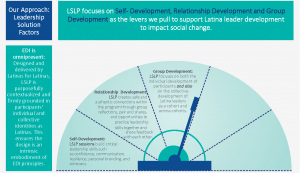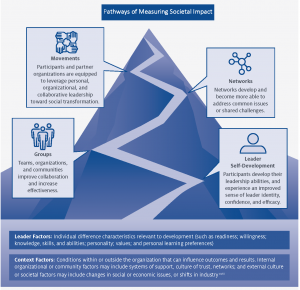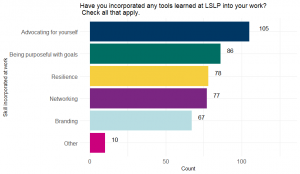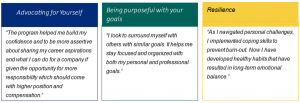By: Elizabeth Brondos Fry and Michelle Schneider
At the Center for Creative Leadership (CCL), we use the Societal Impact Framework[i] to design leadership development programs that will not only support individual leaders, but also improve the well-being of their communities and the world itself.
One program that exemplifies impact at multiple levels, positively benefiting both individual Latina leaders as well as their broader communities, is the Latina Success Leadership Program (LSLP), developed in partnership with MANA de San Diego. In this blog, we describe and examine the LSLP through the lens of our framework and highlight its extensive impact.
Empowering Latina Leaders: Addressing Systemic Barriers through Targeted Programs
Hispanic/Latinx leaders develop within a challenging context. Although there have been advances in conversations around equity, diversity, and inclusion (EDI) across the United States in the last few years, the Hispanic/Latinx community is under-represented in public discourse about racial equity. [ii] Despite comprising almost 20% of the U.S. population[iii], only 4% of executive ranks are Hispanic/Latinx. [iv] Representation is even lower for Hispanic/Latina women, who make up just 1.6% of Fortune 1000 senior executives[v] and under 4% of U.S. Congress[vi]. Latina women earn only 57 cents for every dollar white men make.[vii]
In addition to compensation and representation, time and opportunities are also contextual challenges: In our survey of LSLP alumni, top challenges were balancing multiple identities and overcoming systemic barriers as Latinas, such as facing discrimination and working harder for credibility. The lack of representation and role models can lead to isolation and burnout. Latinas can also face cultural taxation, which involves higher expectations for employees of color to serve on committees and task forces related to EDI.[viii]
Organizational and societal support through representation, mentorship and sponsorship is important for Latina leaders’ success and wellbeing. When organizations have greater representation and inclusion, employees are happier, which in turn improves employee retention, engagement, and innovation contributing to organizations’ bottom lines.[ix],[x]
This underscores the need for a Latina-specific leadership development program like LSLP. In this blog, we aim to explore:
- The potential of an identity-based leadership program for Latina women.
- The impact of such a program on individual Latina leaders and at a network level.
MANA de San Diego’s Latina Success Leadership Program Origins and Description
In 2014, LSLP co-founder Adela Garcia discovered that Latinx individuals held fewer than 4% of senior roles in companies, a figure unchanged since 1971. Despite serving on the board of MANA de San Diego, a Latina-supporting organization, she saw a lack of resources for Latinas in professional roles. Consequently, she and other Latina leaders in San Diego created the LSLP in collaboration with CCL, aiming to boost Latina representation in public and private sectors.
CCL’s approach to leadership development, viewing leadership as a social process rooted in relationships, is core to LSLP. The program designers believe in every Latina’s leadership potential and built a program that cultivates a safe environment for connection, shared experiences, and collective growth. Annually, LSLP selects mid-career Latinas for a 4-month program comprising four half-day sessions on empowerment, resilience, personal branding, networking, and civic engagement. Since its founding in 2015, 250 Latinas from seven cohorts have graduated from LSLP. [xi]
LSLP’s design mirrors leadership solution factors (areas of program focus based on resources and leadership needs) from CCL’s Societal Impact (SI) Framework, focusing on Self-Development, Relationship Development, and Group Development (see image below). Equity, diversity, and inclusion are integral to LSLP’s design. While the program’s leadership topics are broadly applicable, LSLP uniquely acknowledges the complexities of being a Latina leader and recognizes the individual, cultural, and systemic supports and barriers to Latina advancement.
MANA de San Diego’s Latina Success Leadership Program (LSLP) Contexts of Leader(ship) Development: The Levers We Pull

Evaluation Methods and Approach
To measure the impact of the program, CCL evaluators created a survey for program alumni. The survey included both open-ended qualitative questions and qualitative rating questions. By the end of 2022, alumni from six cohorts (2015-2021) provided insights on the skills and knowledge gained, networks formed, barriers encountered, and supports received through the program. Data was also captured on the LSLP’s influence on alumni’s education, careers, and civic engagement. Additionally, the survey explored current challenges still faced by Latina leaders. After analyzing the post-program survey results, we interviewed the LSLP co-founder and key MANA de San Diego staff for further insights.
Given the that we often deliver leadership development programs in ever changing organizational and social environments, taking an agile and collaborative approach to measurement is crucial.i This absolutely held true with LSLP. We worked closely with MANA de San Diego from the start, connecting regularly to adjust the evaluation plan to ensure success. For example, part way through the evaluation process, we added an evaluation partner to the team who shares the lived experience with LSLP alumni as a Latina leader in her own field, to improve our ability to make sense of the data. This additional team member strengthened our qualitative coding process and enabled us to complete the work more thoroughly. We also found that analyzing these data and building relationships with our MANA de San Diego colleagues further committed us to illuminating barriers to Latina leadership and how LSLP helps address them. As a result, we added additional questions to the alumni survey, creating a second phase of data collection from LSLP co-founder and key staff, and even deciding to write this impact blog.
Multi-Level Impact of the Latina Success Leadership Program

Based on the focus of the leadership solution, there are multiple pathways of measuring societal impact (see graphic on right). Impact can be measured across several different levels. As leaders grow, their changes can then spread across groups (group development), networks (relationship development), sparking broader movements.i
To examine the multifaceted impact of LSLP, we applied our Societal Impact Frameworki. The framework recognizes that societal impact often begins by developing individual leaders (self-development). LSLP has demonstrated significant impacts on individual Latina leaders and their networks, planting seeds for future movements of social transformation.
Leader Self-Development Impact
Data from 125 alumni across seven cohorts indicated that LSLP substantially impacts Latina leaders both personally and professionally.

In addition to the quantitative results above, analysis of qualitative data showed that an increase in self-confidence was a major theme mentioned by alumni as the most significant impact of LSLP on their own development as a leader, professionally, and on their life in general. As shown in the bar graph below, advocating for themselves was the top skill that alumni incorporated at work. This not only helped them attain promotions, but also led to other outcomes such as salary increases, leaving toxic work environments, pursuing professional development opportunities, and seeking mentors and coaches. Increased confidence extended to life overall, helping alumni believe in themselves and fully accept themselves. CCL research suggests confidence consistently indicates leader success[i], so this is highly impactful.

Group Level Impact
Increased building of authentic relationships and professional connections within each cohorts was another major impact theme reported. Alumni appreciated connecting with leaders like themselves and sharing experiences during the programs. Feeling represented is powerful: Adela Garcia shared a story about participant almost in tears, saying: “I’m the only one who looks like me in my company, and when I’m here today looking at all these faces, I realize that I’m not the only one like this in the workplace.” Another alumna appreciated being in a cohort of professional Latina women who are your ‘cheerleaders’ on the same journey in different industries all looking to lead as Latina women in their own authentic way. LSLP not only provided an internal community to support cohorts of individuals in their journeys, but also empowered Latinas to see and seek other connections in the community.

Network Level Impact
Individual gains had ripple effects on the alumni network and broader community. Over two-thirds of alumni stay in touch, many through a LinkedIn group where they share resources and provide support. Alumni enjoy in-person gatherings, such as an upcoming event where they will discuss the survey results and reflect on the impact of LSLP. MANA de San Diego leaders hope to expand networking opportunities for LSLP graduates even further. A crucial component of LSLP is having this network of mutual support and inspiration. When asked about impactful Latina leaders, alumni named people both inside and outside LSLP, citing top characteristics of support, inspiration, mentorship, and sponsorship.
The ripple effect extends beyond the alumni group, into their networks. Ninety-five percent shared LSLP lessons with at least one person, over half with at least six people. Half of alumni increased civic engagement, some attaining public office like city council. Alumni have attained prominent leadership positions influencing organizations including MANA de San Diego itself – 54% of its board, 60% of committee chairs, and all three members of the top executive committee have LSLP connections.
The impact of LSLP cascades down to supporting future generations of leaders, as alumni have been mentors for MANA de San Diego’s Hermanitas program for grades 7-12 and have been involved in the College Success program. MANA de San Diego leaders envision that Hermanitas participants learn about College Success and LSLP and want to participate. They also want to expand support for young professional Latinas after college and before LSLP eligibility. This creates a leadership pipeline that MANA de San Diego leaders see as a repeatable process than can be a model nationally. Though LSLP is a strong program, more Latinas in leadership roles can make it stronger still, because they will in turn support the development of other Latina leaders along the pipeline. This support is crucial, because our research shows that supportive managers who care about their employees’ development increase leadership programs’ impact, not only on individuals but also in building networks. [i],[ii] In order for the transformative potential of programs like LSLP to reach beyond the individual, it’s necessary for organizations and managers to understand how important this work is in fostering a more inclusive and supportive environment.
Creating Potential for Social Movements
LSLP’s influence on individuals and networks paves the path toward movements – our framework’s highest impact level where people and organizations leverage leadership toward societal transformation. LSLP is a pipeline and entryway for Latinas to engage in volunteering. For example, LSLP alumni in executive roles at major corporations in San Diego make strategic decisions about their employees and the future impact of these organizations. Similarly, those elected to city council shape policies through civic engagement. Latina leaders in companies can also help create more equitable environments benefitting all employees.
Measurement for continuous learning and improvement
Our Societal Impact Framework highlights that the purpose of measurement should go beyond assessing post-program impact to include continuous learning and improvement, program sustainability and scalability, and to center participant experiences and voices.i In the case of LSLP, the measurement doesn’t stop after a one-time post-program impact study. Rather, measurement is embedded throughout LSLP – participants provide feedback on their experience after every session. This ongoing feedback is discussed internally at CCL and with MANA de San Diego staff.
In addition, the MANA de San Diego team has expanded the purpose and use of these impact findings, focusing on continuous learning and on the future. Not only have they used these evaluation data to inform changes to the LSLP key content, they have also used key data points to educate state legislators and policymakers at the state capitol. They are leveraging learnings from these data to re-engage LSLP alumni and this winter, gathering them to discuss study findings and understand what additional support alumni need for their professional journeys. We have recently learned MANA de San Diego plans to share findings with San Diego employers and partners to demonstrate the need for greater representation of Latinas in leadership and to highlight LSLP as powerful pipeline.
It is not just MANA de San Diego that is continuing to learn from this impact study. Based on some of the findings we are challenging our thinking around EDI/single-identity programs. Specifically, CCL is considering how to focus individual development in service of accelerating organizational and systems-change and the sequencing of this work. We are also wondering how we might be able to convene stakeholders from other identity-based leadership development programs to facilitate opportunities for shared learning.
Final Thoughts
LSLP exemplifies the power and impact of leadership programs designed by and for specific groups. In the program design, the founders leveraged cohort models and peer support to provide inclusion and inspiration. As a result, LSLP has had deep personal impacts on confidence and networking, which have extended to larger networks through participants’ leadership in workplaces and organizations, civic engagement, and advocacy.
Evaluation should mirror program design in its collaborative approach and in centering equity, diversity, and inclusion. The LSLP founders intrinsically understood the unique barriers, needs, and experiences of Latina leaders who would become program participants. We centered participant voices by interviewing the LSLP co-founder and MANA de San Diego staff, which helped us to more intentionally identify the ways that LSLP is building toward societal impact. We feel optimistic about this ongoing partnership between CCL and MANA de San Diego and look forward to continuing to learn together about the continued impact of this program.
We invite other colleagues to evaluate leadership development through a similar lens, considering questions such as:
- In what ways do programs align with our Societal Impact Framework, and where do we fall short?
- What’s possible when we are centering the experiences, voices and needs of participants in both the design AND evaluation of impact and learning of the program?
- How can we make sure that learning and continuous improvement expand beyond the end of a program?
Finally, it is important to re-emphasize that social capital and organizational support remain critical for leaders’ success. While identity-based leadership programs equip leaders with tools to better navigate challenges, social transformation is not the sole responsibility of leaders with the identities represented in these programs – it truly takes all of us to flip levers towards social change. Systemic change also requires institutions and employers to provide representation, sponsorship, and flexibility. We call on organizations to join in creating equitable environments where all employees can thrive.
[i] Ehrlich, V. (2022). Leadership Development as a Lever for Social Change. Center for Creative Leadership. https://cclinnovation.org/wp-content/uploads/2022/07/leadership-development-as-a-lever-for-social-change.pdf
[ii] Garcia, K., Perez-Sanz, S., Mejia, P., & Gehlert, H. (2023, March.) Elevating Latino Experiences and Voices in News About Racial Equity: Findings and Recommendations for More Complete Coverage. Berkeley Media Studies Group. https://www.bmsg.org/resources/publications/elevating-latino-experiences-and-voices-in-news-about-racial-equity-findings-and-recommendations-for-more-complete-coverage/
[iii] United States Census Bureau, https://www.census.gov/quickfacts/fact/table/US/RHI725222
[iv] Mantas, J. (2020, September.) Closing the Hispanic leadership gap: Why it’s in everyone’s best interest. IBM. https://www.ibm.com/thought-leadership/institute-business-value/en-us/blog/hispanic-leadership-gap
[v] Guynn, J., & Fraser, J. (2022, August.) Only two Latinas have been CEO of a Fortune 500 company. Why so few Hispanic women make it to the top. https://www.usatoday.com/story/money/2022/08/02/hispanic-latina-business-demographics-executive/10157271002/?gnt-cfr=1#:~:text=Hispanic%20and%20Latina%20women%20make,3.2%25)%2C%20USA%20TODAY%20found.
[vi] Latinas in Elective Office. Center for American Women and Politics. https://cawp.rutgers.edu/latinas-elective-office
[vii] Bleiweis, R., Frye, J., & Khattar, R. (2021, November.) Women of Color and the Wage Gap. Center for American Progress. https://www.americanprogress.org/article/women-of-color-and-the-wage-gap/
[viii] Joseph, T. D., & Hirshfield, L. E. (2011). ‘Why don’t you get somebody new to do it?’ Race and cultural taxation in the academy. Ethnic and Racial Studies, 34(1), 121-141. https://doi.org/10.1080/01419870.2010.496489
[ix] Eswaran, V. The business case for diversity in the workplace is now overwhelming. World Economic Forum.
https://www.weforum.org/agenda/2019/04/business-case-for-diversity-in-the-workplace/
[x]Pearsall, S. & Schneider, M. (2020). Want to Boost Your Bottom Line and Beyond? Invest in Women Leaders https://cclinnovation.org/news-posts/want-to-boost-your-bottom-line-and-beyond-invest-in-women-leaders/
[xi] It is important to note that during the Covid-19 pandemic, LSLP continued to operate after the organization and facilitators adapted the program for delivery online for 2020 and 2021.
[xii] Kosovich, J., & Wormington, S. Behind the magic: Confidence is the first step to success. Center for Creative Leadership. https://cclinnovation.org/news-posts/behind-the-magic-confidence-is-the-first-step-to-success/
[xiii] Leading Effectively Staff (2020, July 6). How bosses can support their employees’ development. Center for Creative Leadership. https://www.ccl.org/articles/leading-effectively-articles/practical-ways-boss-support-development/
[xiv] McCoy, K., & Fry, E. (2023, January). Put me in, Coach: Supporting developing leaders matters more than you think. Center for Creative Leadership. https://cclinnovation.org/news-posts/put-me-in-coach-supporting-developing-leaders-matters-more-than-you-think/
Special thanks to Adela Garcia, Inez González Perezchica, Michelle Hadley-Torres, Valerie Gomez, Montserrat Auso, Rosa Belzer, and Cristina Padilla who have been an integral part of LSLP, either as MANA de San Diego staff and/or as program creators, designers, and facilitators. Their feedback and insights helped to enrichen our understanding of the impact of this program.


